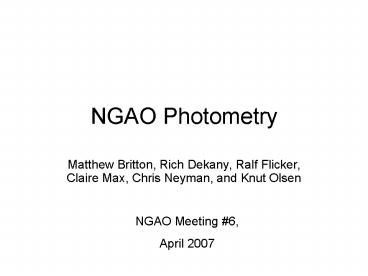NGAO Photometry - PowerPoint PPT Presentation
1 / 25
Title:
NGAO Photometry
Description:
Matthew Britton, Rich Dekany, Ralf Flicker, Claire Max, Chris Neyman, and Knut Olsen ... The Cn2 and wind profiles vary significantly on timescales of minutes ... – PowerPoint PPT presentation
Number of Views:64
Avg rating:3.0/5.0
Title: NGAO Photometry
1
NGAO Photometry
- Matthew Britton, Rich Dekany, Ralf Flicker,
Claire Max, Chris Neyman, and Knut Olsen
NGAO Meeting 6, April 2007
2
Why is SCAO Photometry Hard?
- The Cn2 and wind profiles vary significantly on
timescales of minutes to hours. - This temporal evolution induces variations in the
PSF in time, field location, and wavelength. - Variability in the PSF presents significant
challenges in performing photometry on
observations of crowded fields and resolved
objects.
3
(No Transcript)
4
A Simple Example
- Seeing Limit
With AO
5
Pathways to PSF Variability
- Residual guide star wavefront errors
- Anisoplanatism
- Scintillation
- Telescope and instrument optics
6
Residual Guide Star Wavefront Errors
- Fitting error
- Servo error
- Measurement error
7
Strehl vs. Wavelength
8
Anisoplanatism
9
(No Transcript)
10
Scintillation
11
Telescope and Instrument Optics
- Non-common path errors
- Changing gravity load
- Field rotation
12
Strehl Ratios vs. Time
c.f. Christou, Gladysz
13
Astronomical Applications
- Planetary astronomy
- Volcanoes on Io, rings of Uranus, Titans
clouds, asteroids. - Stellar photometry
- Sag A flares, followup of Ogle-type surveys,
stellar population surveys. - Extragalactic astronomy
- Spatially resolved spectroscopy of galaxies.
14
Photometry
- We can do aperture photometry when sources are
sufficiently well separated so that there is no
PSF blending. - If we knew the PSF delivered by the AO system, we
could deconvolve our images and IFU spectra and
do photometry directly. - Observe a calibration star or field
- Stinebring
- Find some way to estimate the PSF
15
PSF Estimation Methods
- Guide star PSF estimation from telemetry data
- PSF estimation from image data
- PSF estimation from Cn2 profiles
16
Guide Star PSF Estimation from Telemetry Data
OTF approach to estimate in-band errors from
telemetry data, out of band errors by integrating
Kolmogorov power spectrum
Curvature Sensors
- Jean Pierre Veran, CFHT
Shack Hartman Sensors
- Laurent Jolissaint, Gemini
- Mike Fitzgerald, Lick
- Jose Marino, National Solar Observatory
- Yann Clenet, VLT
17
PSF Estimation from Image Data
- IDAC, Mistral, AIDA
- Simultaneously solve for PSF and deconvolved
image - Constrained to operate within an isoplanatic
patch - Suffer from many degrees of freedom
- Starfinder, parametric blind deconvolution, Swan
- Parametric models can account for anisoplanatism
- MTF approach
- A one dimensional model
18
PSF Estimation from Cn2 Profiles
- Use measured guide star point spread function and
measured Cn2 profile to estimate field dependent
PSF. - Factors the problem of guide star PSF estimation
from that of field dependent PSF evolution due to
anisoplanatism. - No free parameters in estimating the field
dependent PSF
19
A Crowded Field Observation
20
Modeling a Crowded Field
21
Deconvolution with a Field Dependent PSF
- Divide image into subfields with dimension of
order the isoplanatic patch size - Use local estimate of the PSF to perform
deconvolution using some method (FFT,
Richardson-Lucy, matrix inversion)
22
Deconvolution Pipeline
- Find a way to successfully estimate the guide
star PSF from Shack Hartmann telemetry data - Use Cn2 profiles and estimated guide star PSF to
derive the field dependent PSF - Apply deconvolution algorithm using field
dependent PSF estimates - This method can be automated
23
Photometry with Advanced AO Architectures
- MCAO
- MOAO (?)
24
Photometric Considerations for NGAO
- SC LTAO architecture will deliver the same
variable PSF as SCAO. - MCAO architecture will deliver a PSF that is more
stable over the field, but still varies in time. - Photometric performance for wide field MOAO mode
is really an open question.
25
Working Groups Recommendations
- Secure a turbulence profile monitor for Keck
Observatory - Consider an auxiliary PSF monitoring camera for
NGAO - Consider assessing current level of photometric
performance using NIRC2 and/or OSIRIS - Consider providing a deconvolution pipeline for
NGAO

